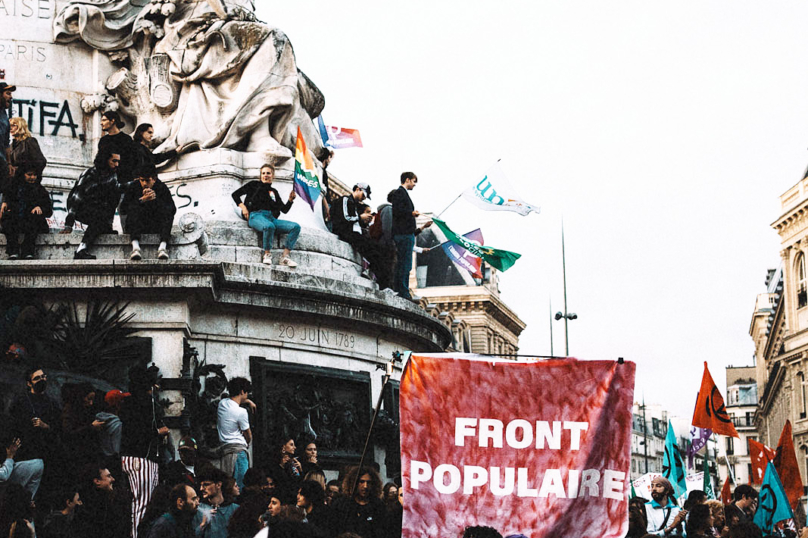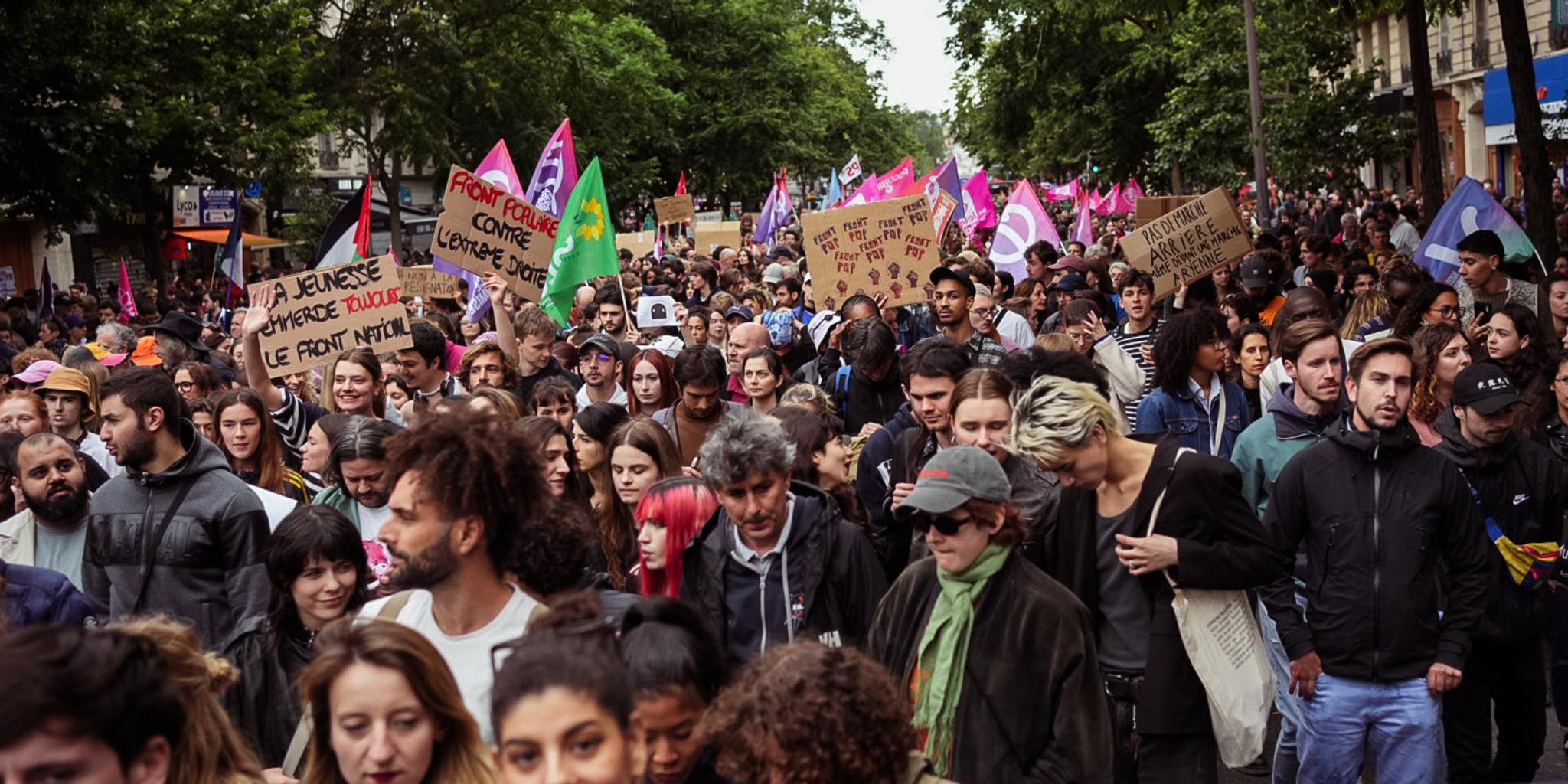Why I support the New Popular Front

I am a christian, and to be a christian entails radical ethical commitments: put secularly, I am a communist. It is for this reason that I support the New Popular Front both as a bulwark against the rise of fascism in France and as a tool of the working class to win real gains: put simply, the Popular Front is both ethically imperative and politically strategic. If the Popular Front fails to overcome the far-right on June 30th, then its ongoing mobilization will serve as the beginning of a long and perilous struggle against the antisocial union of the center and neofascists. If the Popular Front succeeds, we can reverse the worst of Macron's antisocial program and deliver prosocial reforms. In either case, now is the time to join the mass movement and push.
The rise of the far-right in France is an arduous tale, and I will sketch here the outline for those unfamiliar with the history but interested in the stakes: Marie Le Pen and Jordan Bardella's National Rally (RN) party is the rebranding of the old National Front (FN), a party founded by Nazi collaborators and Waffen-SS members Léon Gaultier and Pierre Bousquet among other reactionaries like Jean-Marie Le Pen, a man prosecuted and convicted repeatedly of hate speech, including Holocaust denial. The RN is a party with real links to fascist gangs like the Ordre Nouveau, GUD, and Aquila Popularis—not only historically, but presently: RN politicians like Rodolphe Cart have public ties to the latter two organizations. There is even a scandal concerning the RN, big business, and Daesh. This is why the “republican” forces in French politics before Macron often tried to block the RN from coming to power: the RN was not seen as a normal party like the others, but a threat to the postwar order: it is a neofascist organization.
As for Macron, a friend recently wrapped up his tenure neatly: “Emmanuel was so unpopular in his first term that he declined to defend his mandate on its merits and merely ran on 'it's me or the fascists' the second time.” I have been asked repeatedly why I think Macron decided that, faced with humiliation in the European elections, he dissolved the National Assembly and called snap elections with only a few weeks allotted for campaigning. I do not know why he did. My present opinion is that Macron wants to bring the RN to power and govern with them, probably in order to subdue the Left and also dirty the reputation of the RN by giving them some power that he can still guide: put another way, he may think that he can drain their popularity by weighing down their protest vote appeal with the burdens of responsibility. Whatever his motivation, Macron's decision has been aptly described as a reckless gamble.
While averting the far-right's rise to power is certainly motivating in itself, my support for the Popular Front is not a “lesser of two evils” or “holding my nose” electoral triangulation, but an earnest deisre to see the reforms proposed by the Front enacted. Let me list just a few here:
- lower the retirement age to 60 years old
- raise the minimum wage
- provide free school lunch
- impose an inheritance tax on the rich
- index pay to inflation
- make France carbon neutral by 2050
- ban new highways
- stop ecocidal water “mega-basins”
- provide papers for undocumented immigrants
- recognize the state of Palestine
- arms embargo against Israel
- cancel debts of Ukraine
- work for a new constitution and more democratic Sixth Republic
Many of these proposals meet demands made by ecological movements like the Soulèvements de la Terre and leading labour unions like the CGT. The Popular Front has the support of more than 100 activist groups composed of feminist, queer, antiracist, &c. militants; the Popular Front also unites all the significant electoral parties of the Left, apart from some fringe sectarians. This is the largest Left coalition in decades, and represents a significant advance from the failed NUPES electoral bloc of 2022. Given the bizarre and at times comical fractures on the Right, the Popular Front can actually win—and that victory would belong to the working class.

There is a marked difference between the New and Old Popular Fronts in this respect: the Old was cross-class and deescalatory from the point of view of the workers' vanguard, while the New is driven by the workers' and allied movements, pushing the social-democratic fraction from talk to action. Moms I meet on the playground are asking me when the next protest is. Macron, Bardella, et al. have been unmasked as collaborators with the bosses. Useless electoralists have transformed into partisans of antifascism. Youth march under a red banner reading only “1871” alongside retirees. After the end of the COVID lockdowns, France has been increasingly contested: rural unrest, urban clashes, and now a nation-wide conflict: “which side are you on?” is the question of the day.
Now I have no guarantee to give, only my perspective as one who has witnessed a decade of struggle in this Republic: the New Popular Front is a critical opportunity to reverse the worst effects of contemporary neoliberalism. We have, ready-to-hand, a tool with which to break atomisation, to loosen the noose of ecocide, and to spread the struggle for freedom. I believe that all friends of liberty, all people of goodwill, have an ethical responsibility in this time and place to push the New Popular Front to victory over the forces of infamy and beyond its own limits.
The French electoral Left has two key problems: celebrity and conservatism. The problem of celebrity is something most anglophone readers can intuit: we have all seen both the upsides and downsides of politics as personality in the cases of Bernie Sanders, Jeremy Corbyn, the Squad, & al. A Popular Front victory could be undermined by the chicanery of Jean-Luc Mélenchon, François Ruffin, and Fabien Roussel jostling for power. We have already seen the moral debasement and political ineptitude of some La France Insoumise cadres threaten the integrity of the Popular Front.

As for the issue of conservatism, it is well-known that the institutional Left has lost a significant portion of its base to the far-right. I read reactionaries like Eric Zemmour as honest in their admiration of old Left leaders like Georges Marchais who were cabapable of both brilliant showmanship and antisocial cruelty. There is a real and present danger that, in attempting to win back workers from the far-right, the Left could take on conservative or even reactionary politics. This tendency can already be seen in some Communist Party propaganda. The irony is of course that the Marchais era marked the beginning of the PCF's precipitous decline in membership. The success of the Popular Front requires opposition to this tendency from within and without.
Faced with all the above, how can the friends of honor and dignity overcome? In these weeks of strikes and protests, we first of all must be present and active as I have already said. We should use the opportunity that the suspension of sectarian partisanship opens to us to build a parallel, that is, a supplementary mobilizing force that autonomously organizes in the emerging context. Such a new force can do now what the gilets jaunes did pre-COVID: draw out and up the latent capacity of the populace into new modes and orders of struggle beyond the limits of the ballot-box. This opening, this teleological suspension of sectarianism, is too important to scoff at. We are living through a rift in neoliberal depoliticization, a moment where suddenly it is not only sensible but necessary to discuss politics with our neighbors and even strangers. In the words of a feminist activist I spoke to at the last march, “the question of politics, of what is this economy, is now being posed—not just the same old TV culture-war debates.” Is that revolutionary?
No-one knows or holds the secrets of the future. Even the most clear-sighted among us have only hazy premonitions at best, passing and vague glimpses. Only the revolution, in clearing the terrain, will reveal the horizon, slowly lift the veil, and open up the routes, or rather the multiple paths, that lead to the new order. Those who claim to have a complete map of this unknown land in their pocket—they are crazed. Those who seek to maintain the wild moors of our present moment until we have first drawn up the desired map—they are enemies of the human race. —Blanqui
